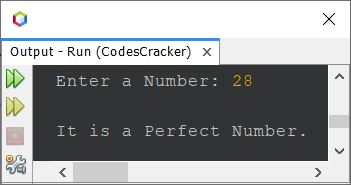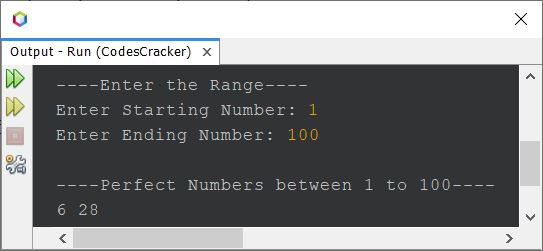- Java Basic Programs
- Java Programming Examples
- Java Print Hello World
- Java Get Input from User
- Java Print Integer
- Java Add two Numbers
- Java Check Even or Odd
- Java Check Prime or Not
- Java Check Alphabet or Not
- Java Check Vowel or Not
- Check Reverse equal Original
- Java Fahrenheit to Celsius
- Java Celsius to Fahrenheit
- Java Perfect Number Program
- Java Find Quotient Remainder
- Java Days to Seconds
- Java Count Digits in Number
- Java Binary Number Addition
- Java Discount Program
- Java Compute Courier Charge
- Java Find Telephone Bill
- Java Print ASCII Values
- Java Check Palindrome or Not
- Java Check Armstrong or Not
- Generate Armstrong Numbers
- Add two Numbers using Pointers
- Java Mathematical Programs
- Add Subtract Multiply & Divide
- Java Make Calculator
- Java Add Digits of Number
- Java Check Leap Year or Not
- Java Check Divisibility
- Java Find Simple Interest
- Java Find Compound Interest
- Java Print Fibonacci Series
- Java Find nCr nPr
- Calculate Average & Percentage
- Java Calculate Arithmetic Mean
- Java Calculate Student Grade
- Java Print Table of Number
- Java Print Prime Numbers
- Java Add n Numbers
- Java Interchange two Numbers
- Java Reverse Numbers
- Java Swap two Numbers
- Count Positive Negative & Zero
- Find Largest of two Numbers
- Find Largest of three Numbers
- Java Find Factorial of Number
- Java Find HCF & LCM
- Area & Perimeter of Square
- Area & Perimeter of Rectangle
- Area & Circumference of Circle
- Java Conversion Programs
- Java Decimal to Binary
- Java Decimal to Octal
- Java Decimal to Hexadecimal
- Java Binary to Decimal
- Java Binary to Octal
- Java Binary to Hexadecimal
- Java Octal to Decimal
- Java Octal to Binary
- Java Octal to Hexadecimal
- Java Hexadecimal to Decimal
- Java Hexadecimal to Binary
- Java Hexadecimal to Octal
- Java Pattern Programs
- Java Pattern of Stars
- Java Pattern of Alphabets
- Java Pattern of Numbers
- Java Pyramid of Stars
- Java Pyramid of Alphabets
- Java Pyramid of Numbers
- Java Print Diamond Pattern
- Java Print Floyd Triangle
- Java Print Pascal Triangle
- Java Array Programs
- One Dimensional Array Program
- Java Linear Search
- Java Binary Search
- Find Largest Element in Array
- Find Smallest Element in Array
- Java Reverse Array
- Insert Element in Array
- Delete Element from Array
- Java Merge two Array
- Java Bubble Sort
- Java Selection Sort
- Java Insertion Sort
- Java Find Common Elements
- Java Count Even/Odd Number
- Two Dimensional Array Program
- Java Add two Matrices
- Java Subtract two Matrices
- Java Transpose Matrix
- Multiply two Matrices
- Three Dimension Array Program
- Java String Programs
- Java Print String
- Find Length of String
- Java Compare two String
- Java Copy String
- Java Concatenate String
- Java Reverse String
- Delete Vowels from String
- Delete Words from Sentence
- Find Occurrence of a Character
- Java Find Occurrence of a Word
- Occurrence of Each Character
- Java Occurrence of Each Word
- Java Count Repeated Characters
- Java Count Repeated Words
- Java Capitalize Each Word
- Java Count Vowels/Consonants
- Java Extract Numbers
- Java Count Word in String
- Remove Spaces from String
- Java Sort a String
- Java Uppercase to Lowercase
- Java Lowercase to Uppercase
- Java Swap two Strings
- Java Check Anagram or Not
- Java Check Balance Parentheses
- Java Check Password Strength
- Java File Programs
- Java Read File
- Java Write to File
- Read & Display File Content
- Java Copy File
- Java Append Text to File
- Java Merge two File
- List files in Directory
- Java Delete File
- Java Miscellaneous Programs
- Generate Random Numbers
- Java Print Time & Date
- Java Get IP Address
- Java Shutdown Computer
- Java Programming Tutorial
- Java Tutorial
Perfect Number Program in Java
This article is created to cover perfect number program in Java. That is, the article contains some programs on perfect number. But before creating the perfect number program, let's first understand, what does it mean by perfect number.
A perfect number is a number that is equal to the sum of its positive divisors (excluding the number itself). For example, 6, 28, 496 etc. are perfect numbers. Because:
6 = 1+2+3 = 6
where 1, 2, and 3 are positive divisors of 6. Similarly:
28 = 1+2+4+7+14 = 28
Check Perfect Number using for Loop
The question is, write a Java program to check whether a number entered by user at run-time, is a perfect number or not using for loop. The answer to this question, is the program given below:
import java.util.Scanner; public class CodesCracker { public static void main(String[] args) { int num, i, sum=0; Scanner s = new Scanner(System.in); System.out.print("Enter a Number: "); num = s.nextInt(); for(i=1; i<num; i++) { if(num%i==0) sum = sum+i; } if(sum==num) System.out.println("\nIt is a Perfect Number."); else System.out.println("\nIt is not a Perfect Number."); } }
The snapshot given below shows the sample run of above Java program, with user input 28 to check whether it is a perfect number or not:

Check Perfect Number using while Loop
Let's create the same program using while loop.
import java.util.Scanner; public class CodesCracker { public static void main(String[] args) { int num, i=1, sum=0; Scanner s = new Scanner(System.in); System.out.print("Enter a Number: "); num = s.nextInt(); while(i<num) { if(num%i==0) sum = sum+i; i++; } if(sum==num) System.out.println("\nIt is a Perfect Number."); else System.out.println("\nIt is not a Perfect Number."); } }
The output produced by this program, is exactly same as of previous program.
Since in case of while loop, we need to do the initialization part before, and update part inside, the loop. Therefore, while declaring the variable i, I've initialized its value with 1, and inside the while loop, I've added one extra statement, that is i++; to increment the value of i by 1, at each execution of the loop.
Find and Print Perfect Numbers between 1 to 1000
Here is another program used to find and print all perfect numbers between 1 and 1000. This program does not receive inputs from user.
public class CodesCracker { public static void main(String[] args) { int num, start=1, end=1000, i, sum; System.out.println("----Perfect Numbers between 1 to 1000----"); for(num=start; num<=end; num++) { sum = 0; for(i=1; i<num; i++) { if(num%i==0) sum = sum+i; } if(sum==num) System.out.print(num+ " "); } } }
Here is its sample output:

Find Perfect Numbers in Given Range
Now this is the last program of this article, created using for loop to find and print all perfect numbers between a range provided by user at run-time of the program. This program is similar to previous program. The only difference is, the value of start and end variable is received by user.
import java.util.Scanner; public class CodesCracker { public static void main(String[] args) { long num, start, end, i, sum; Scanner s = new Scanner(System.in); System.out.print("----Enter the Range----"); System.out.print("\nEnter Starting Number: "); start = s.nextLong(); System.out.print("Enter Ending Number: "); end = s.nextLong(); if(start<end) { System.out.println("\n----Perfect Numbers between "+start+" to "+end+"----"); for(num=start; num<=end; num++) { sum = 0; for(i=1; i<num; i++) { if(num%i==0) sum = sum+i; } if(sum==num) System.out.print(num+ " "); } } else System.out.println("\nInvalid Input!"); } }
Here is its sample run with user input 1 as starting, and 100 as ending number to print all perfect numbers between 1 to 100:

« Previous Program Next Program »